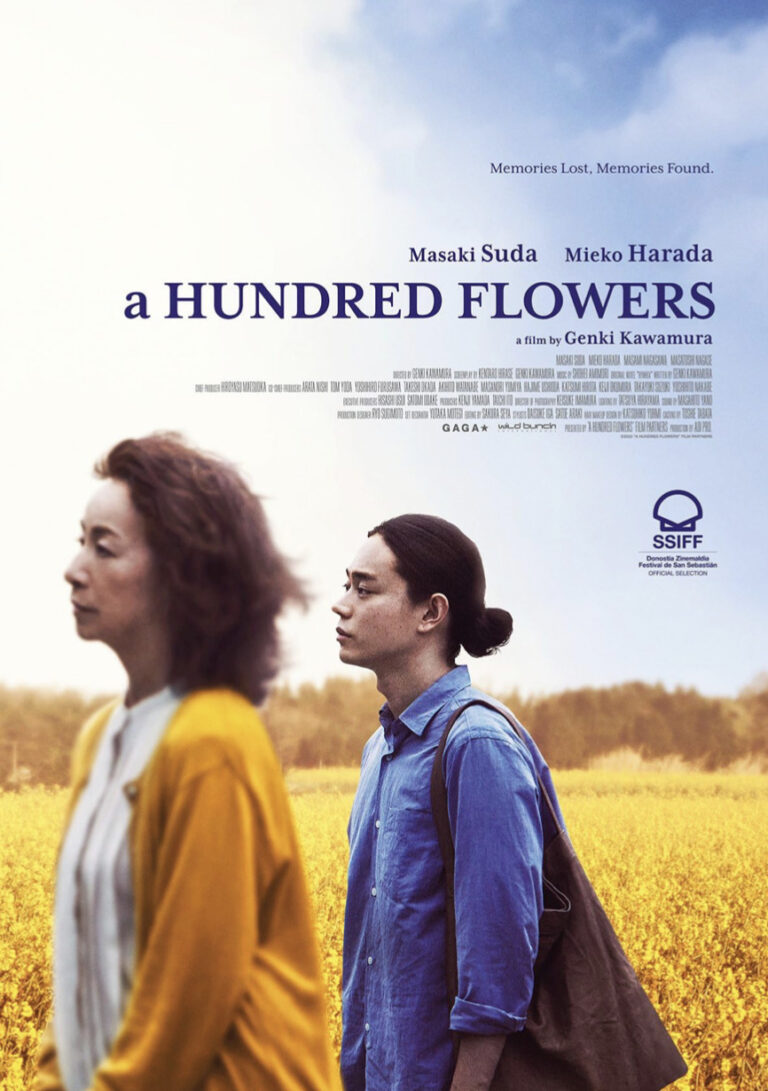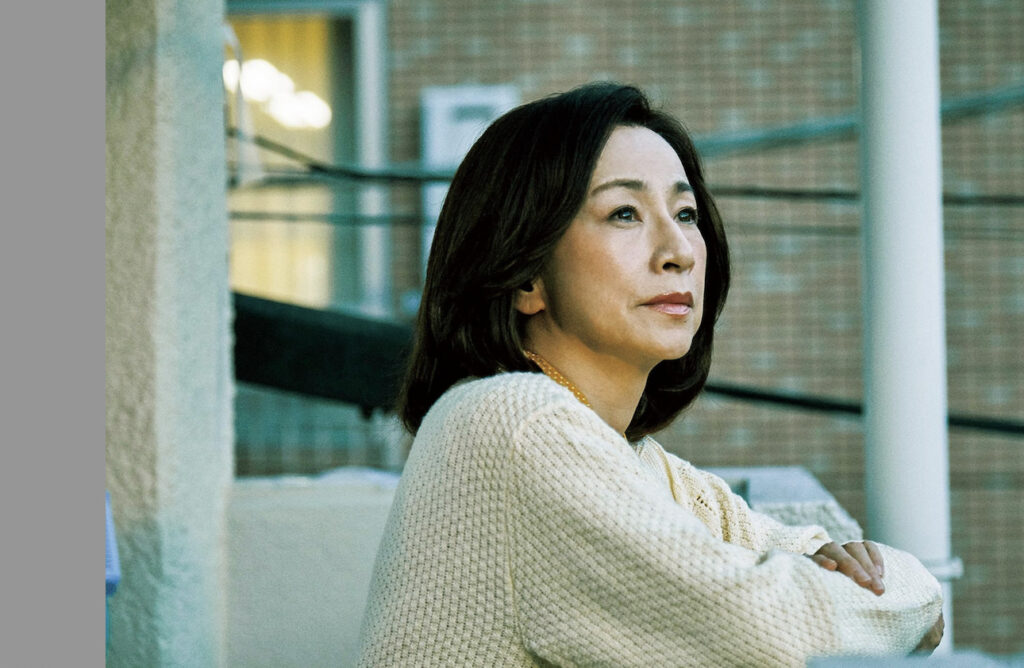
When people maintain animosity over their parent’s willingness to put their own needs ahead of fulfilling their parental obligations, their unwillingness to forgive and forget can lead to lasting regrets for both. The seemingly unforgettable bitterness that drives the strained mother-son relationship in the new Japanese drama, A Hundred Flowers, are put to the test when she begins losing those tense memories.
Accomplished movie producer and screenwriter Genki Kawamura made his feature film directorial debut on A Hundred Flowers. He also co-scribed the drama’s script with Hirase Kentaro, after penning the acclaimed novel of the same name.
A Hundred Flowers follows Yuriko (Mieko Harada), a middle-aged piano teacher whose memory and mind are quickly fading as dementia fractures and undoes her grip on reality. After her son, Izumi (Masaki Suda) begins to realize that his mother’s health is in decline, he finds himself transported back into the uncertain world of his own memories and the tangle of their common past. He’s most haunted by his mother abandoning him for a year when he was a child in elementary school.
After several months of consideration, Izumi eventually decides to move his mother into a nursing home, where she can receive the proper attention and care she needs every day. While having difficulty forgiving his mother for her past transgressions, the urging of his wife, Kaori (Masami Nagasawa), who’s pregnant with their first child, convinces him to reconsider repairing their strained relationship before her health completely deteriorates.

A Hundred Flowers thrives most on being adapted for the screen by its novelist. Throughout the film’s production, Kawamura naturally infused the project with a captivating poetic sensibility in its captivating characterizations, resonant leitmotifs and realistic visuals composition.
Yuriko’s growing disorientation smartly serves as the main catalyst of the decades-long internalized pain that both she and Izumi are now forced to face together. The movie is told from both Izumi and Yuriko’s perspectives, and interviews flashbacks of their shared and individual memories of their key life occurrences with routine moments from the present day.
As the drama’s screenwriter and director, Kawamura’s exploration into the mother and son’s varying views on their shared experiences emotionally holds the story together. The most notable memory that drives the mother and son’s contemplation over whether they can accept forgiveness in their relationship was Yuriko’s desperation to find her own identity while she was raising Izumi as a single mother.
However, he has always viewed her inattentiveness to his needs as abandonment, especially as he contemplates his ability to be able to love and support his first child. With Kaori‘s encouragement, Izumi begins to realize that being a good parent doesn’t mean that he always has to make the perfect decision on the first try. Instead, it also involves recognizing and atoning for the mistakes he’s destined to make and may not always remember, just like his mother.
Harada and Suda both infuse their performances with grace as they highlight their respective characters’ determination to embrace the time they have left together. The actress shows her empathetic understanding of dementia and its affects on families, particularly parents and children.
Harada’s personal understanding of Yuriko’s physical and emotional struggles comes after the performer made the 2020 short documentary, Actress Hisako Harada. The film explores her own mother’s personal experiences with advanced stage dementia, and their journey of reconnecting following the diagnosis.

Suda brings his character on a realistic emotional journey throughout A Hundred Flowers‘ storyline. In the movie’s initial scenes, he emphasizes how Izumi is still hesitant to fully commit to repairing his relationship with his mother.
While his character visits his mother in her home for the New Year’s holiday, which is also her birthday, Suda passive aggressively reassures her that he wants to spend time with her. However, he quickly makes an excuse to leave after he receives a call from Kaori, who only wants to check in on how their evening’s going.
The actor makes it clear that his character will do whatever he can to keep the two women apart. He’s also even content to maintains the secret from his mother that Kaori is pregnant.
But later in the drama, after Yuriko is officially diagnosed following a misunderstanding she has at the local grocery store, Suda subtly begins to infuse Izumi with the realization over how dire his mother’s health has become. While the mother-son relationship will never be completely repaired, Izumi begins to accept the fact that forgetting some of life’s most painful memories can ease some of their suffering and agony.
The delicate balance Harada and Suda created over repairing the tension between their characters, as well as learning and growing from finally acknowledging the other’s perspective, is highlighted by the film’s alluring cinematography. The movie’s Director of Photography, Keisuke Imamura emphasizes the pain and confusion Yuriko and Izumi are contending with following her diagnosis through intimate close-ups of their reflective facial expressions.
A Hundred Flowers also features expert rehasings of Yuriko repeating daily tasks that initially appear to be mundane, but ultimately prove to leave lasting effects on her life. That’s certainly the case when walking through the same section of the aforementioned grocery store to choose the same item, or walking up the same flight of stairs in her son’s elementary school when she believes he’s still a student there, Imamura’s camera work doesn’t make the actions feel repetitive. Instead, they visually represent Yuriko‘s growing forgetfulness, as well her desire to return to a time in which she felt happier and more in control.
A Hundred Flowers is an equally devastating and graceful intimate exploration into the long-lasting effects that memories have on relationships and people’s sense of identity. Harada and Suda emotionally bring Kawamura’s realistic, relatable story to the screen, as they emphasize Yuriko and Izumi’s contemplation over whether they can accept forgiveness in their relationship. Further amplified by Imamura’s stellar cinematography, the emotionally charged film meaningfully deals with how memories, resentments and forgetfulness all influence the need for forgiveness in personal relationships.

Grade: B+
A Hundred Flowers had its New York premiere on Sunday, July 16 at Film at Lincoln Center during the New York Asian Film Festival (NYAFF).

